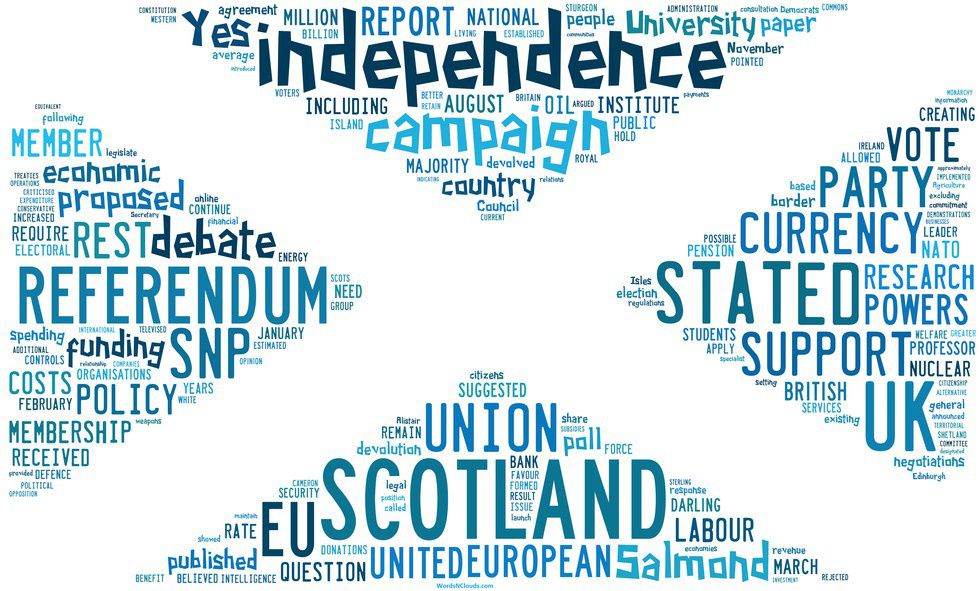Prime Minister, David Cameron recently announced that The United Kingdom will hold a referendum on Britain's European Union membership June 23 of this year. The upcoming referendum is being referred to as Brexit.
Many questions are arising as the prospects of the UK leaving the EU becomes more of a possible reality than ever before. How will this influence the already struggling economy of the EU, seeing as the UK is the second largest economy in the partnership? How will the UK's international trade be influenced if it leaves the EU? What will become of immigrants living in the UK that are from other EU countries?
While all of these concerns are valid for all nations associated with the UK, I think there are five countries in particular that should be worried the most. They are the four countries that make up the UK and its neighbor, Ireland.
As a United States citizen, I've come to realize that a wide majority of the United States does not realize or remember that the United Kingdom is broken up into four countries: England, Scotland, Wales, and Northern Ireland. That means Brexit will not be a decision made by one country, but by four individual nations that all have varying views on the subject. However, according the UK's 2013 census England is the most populous nation out of the four countries by over 45,000,000 people. This essentially means England will have the most say on weather the UK stays a part of the EU or not, even if the other countries feel differently.If the overall vote results in the UK leaving the EU, it could completely change Great Britain as we all know it.
Scotland will most likely leave the UK seeing as the people of Scotland are very pro-EU. While the author of The Guardian article, "Think a Brexit vote would push Scotland out of the UK? Think again" disagrees and believes Scotland will stay a part of the UK, he states Scotland is strongly for staying in the EU, while the rest of the UK is about 50/50 on the subject. The thought of independence is also still fresh in the minds of the Scottish seeing as the country held an independence referendum only two years ago in 2014. According to The Guardian's coverage of the Scottish Indepencence Referendum, 44.7% of the country voted for independence while 55.3% voted against it. With the yes no vote being so close, the idea of independence is fresh in the minds of the Scottish. If the UK goes against Scotland's wish to stay a part of the EU, it gives the country the opportunity to hold another referendum. Former Prime Minister, Tony Blair is also convinced Scotland will leave if given a second chance. Northern Ireland will be next.
Northern Ireland is the only country in the United Kingdom not attached to its fellow UK nations. The Republic of Ireland is the only country Northern Ireland has an actual land border with and is not a part of the UK. To say that Ireland's history has been tense in the past is an understatement. Since the Republic gained its independence from England in 1922, the people of Northern Ireland has been in a major divide over their association with the UK. Half of the country wishes to remain a part of the UK while the other half wants to join the Republic. The conflict is historically known as The Troubles and resulted in the death of thousands of Northern Irish citizens. While the tension between the two groups has calmed down considerably since the height of The Troubles from the '70s into the '90s, the conflict between the Northern Irish people still exists. With almost half of the country does not want to be associated with England at all, most of its decisions side more with Scotland. This would put them against the idea of leaving the EU. The prospect of Great Britain leaving the EU may also result in a militarized border between Northern Ireland and the Republic. This would only heighten the potential of The Troubles starting again, which is something no one in the country wants.
Even though the Republic of Ireland separated itself from the UK over 90 years ago, it will be influenced by the possibility of Brexit in more ways than just the chance of a militarized border. Since England is the closest country to the island, its economy is tied closely with England's future decisions. Most Irish imports come from England and many Irish citizens work in England because they can currently travel there without passports because the two countries are in a Common Travel Area. Ireland is also a member of the EU, so the two nations have an amicable relationship because of it. If the UK leaves the EU, importing will become extremely difficult. This will influence all of Ireland's energy from oil to electricity. It will also require Irish citizens to use their passports when traveling to England and cut off their employment possibilities which are already slim in Ireland as it is. Ireland's economy has been down since 2008 when The Celtic Tiger, the highest point in Ireland's economic history, fell. Brexit will devastate the country even further.
While all of the things I've written here are hypothetical, I think it's worth taking into consideration. We've all been so caught up in the uncertainty of the United States future with the presidential election coming this fall. It's important to realize that the United Kingdom is also in the same boat. Things are changing everywhere, even across the pond.









 mr and mrs potato head
StableDiffusion
mr and mrs potato head
StableDiffusion


















